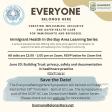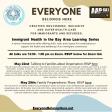The Afghan Health Leadership Consortium (AHLC) invites you to our next provider training by Zoom on Thursday, January 12.
The Mental Health and Wellness of Afghan School-Aged Youth on Thursday, January 12, 2023, 12 noon to 2 pm Pacific Time via Zoom
Register here and see the flyer.
Overview
Newcomer Afghan school-aged children and youth are experiencing multiple challenges with school enrollment and integration, while simultaneously encountering the limited capacity, preparedness, and cultural awareness of school teachers, staff, and administrators. Learn about these challenges and ways to meet these needs through culturally-based programming, trauma-informed treatments, and creating and supporting healing classrooms and learning spaces in school settings.
This training is geared towards our usual healthcare, social service, human service, and other providers to Afghans. Please note that we especially invite colleagues from the education sector to join us.
Featured Speakers
-
Kajal Shahali, Youth Program Manager, RIT - Kajal Shahali works as the Youth Program Manager in Oakland, overseeing Refugee & Immigrant Transitions (RIT's) after-school and youth tutoring/ mentoring programs. Along with overseeing and monitoring part of the agency’s youth programs and Behavioral Health Prevention & Early Intervention programs, she also teaches Refugee & Immigrant Transitions’ Vocational English and Citizenship classes at Harbor House. As an immigrant from Iran and fluent in Farsi, Kajal has worked in a variety of refugee support roles, including with IRC as a Resettlement Caseworker and Education Specialist, supporting newly arrived refugee families to make sure they have access to education services in Oakland and the East Bay. Kajal received her B.A. in Peace and Conflict Studies with a minor in Public Policy from UC Berkeley and holds a Master’s in International Child Studies with a focus on Refugee Children's Right to Education from King's College, London.
- Dr. Sedique Popal, Ed. D., President Noor Islamic and Cultural Community Center; Assistant Professor USF Department of Education - Dr. Sedique Popal has been a professor of Linguistics, Education, and English since 1980. He holds a BA degree in English Literature, a Master’s Degree in Teaching English as a Second/Foreign Language, and a Doctorate in Education with an emphasis in Applied Linguistics. Dr. Popal has taught English and Applied Linguistics and has trained teachers in Afghanistan, Pakistan, Germany, Korea, China, and the United States. He has conducted research in the areas of bilingual education and code-switching and code-mixing and presented at multiple national and regional conferences. In addition to being an Honored Professor at the University of California, Berkeley Extension, Dr. Popal was also awarded the Outstanding Educator Award at the University of San Francisco (USF), and Teacher of the Year Award at the College of Alameda and California State University, Hayward. Dr. Popal has educated thousands of ESL/EFL teachers around the globe and inspired them to activate different learning modalities, lower students’ anxiety, and provide comprehensible lessons. As President of the board of directors of the Noor Islamic and Cultural Community Center (NICCC) since 2011, Dr. Sedique Popal has overseen a thriving community of close to 1,000 members. The NICCC is a non-profit organization that strives to serve the religious, educational, and social needs of the growing Afghan and Muslim community of Contra Costa County and surrounding communities regardless of their origin, race, language, or color.
- Dr. Mohammad Sediq Hazratzai, MD, MPH; Program Director, Public Health Institute (PHI); Visiting Professor, UC Davis Dept. of Public Health Sciences - Dr. Mohammad Sediq Hazratzai is Director of SEHAT Initiative (SI), a program of the Public Health Institute (PHI), established in response to humanitarian and healthcare needs of refugees. SI focus is to improve the health and well-being of refugees in California and throughout the United States. Dr. Sediq is a career public health professional and researcher with extensive experience focused on refugee and immigrant health. As a visiting professor at the University of California Davis, Dr. Sediq teaches refugee health and comparative health systems. Dr. Sediq is also a credentialed Principal Investigator with the Public Health Institute (PHI) and an affiliate with University of California San Francisco (UCSF), Institute for Global Health Sciences. Dr. Sediq has worked with nonprofits, IOM (UN Migration Agency), and Afghanistan’s Ministry of Public Health in projects focused on the most vulnerable populations – refugees, migrants, Injecting Drug Users (IDUs), and HIV high-risk groups. He is a board member with Upwardly Global a leading nonprofit that helps immigrant, refugee and asylee professionals rebuild their careers in the United States. Dr. Sediq speaks English, Dari/Farsi and Pashtu fluently and is an active community member in the Greater Sacramento region helping diverse refugee groups. Dr. Sediq is a trainer with PHI’s Lotus Project focused on child trauma and a research associate with PHI’s HIPUP program.
- Madina Masumi, Training Officer, Cultural Awareness, Switchboard International Rescue Committee - Madina Masumi is a Switchboard Training Officer with a focus on cultural awareness. She is a licensed K–12 school counselor with over a decade of experience serving students from marginalized populations in Fairfax County Public Schools in Northern Virginia. She previously worked as a case manager for public assistance programs. As the daughter of Afghan refugees, Madina has experienced firsthand the challenges of refugee integration. She holds a Master of Education in School Counseling from George Mason University. Madina speaks fluent Dari and is proficient in Spanish.
Topics
After attending our training, you will be able to:
- Identify challenges of enrolling and acclimating Afghan students into schools;
- Describe a bilingual program to teach English to Afghan newcomer students;
- Describe causes of and treatments for child trauma among Afghan refugees; and
- Create and support healing classrooms and learning spaces in school settings.
Register for our next AHLC meeting here:



